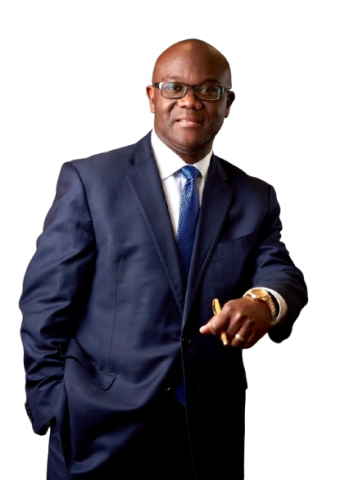Kakra Hughes, MD, is an academic at heart, taking a practical approach to both his life and work, regardless of the starting point. For Hughes, it is never too late to embark on a new journey and explore new possibilities. He grew up in Ghana, West Africa, and moved to the United States a few weeks after turning 17. Once he settled in the States, he attended Central State University in Ohio, a historically Black college, through a scholarship to study water resources management.

In his junior year, Hughes began considering a career change to medicine, shifting his focus away from water resources and applying to medical school. Once this decision was made, he fully committed to his studies.
Hughes earned his medical degree from Wake Forest University School of Medicine. He also holds a Master of Science (MS) in Clinical and Translational Research from Georgetown University and a Doctor of Philosophy (PhD) in Health Services Research from the University of Maryland. He completed his surgical residency at the Martin Luther King, Jr./Charles Drew University Program in Los Angeles County.
He was particularly drawn to vascular surgery due to the emerging technologies associated with endovascular surgery and the opportunity for meaningful connections with patients.
"I liked the fact that you had both long-term involvement with patients as well as short-term involvement. I appreciate the combination of medicine, surgery, and the vascular science, which attracted me to vascular surgery," Hughes said.
Hughes believes his decision to pursue vascular surgery solidified later in his training, ultimately becoming clear during his fourth year of residency at Harvard Medical School/Beth Israel Deaconess Medical Center. He further specialized by completing an Endovascular Surgery Fellowship at the Arizona Heart Institute.
"All the folks who trained me were phenomenal individuals, and I'm deeply grateful to them," Hughes said.
Beginning as an assistant professor, he played a role in strengthening the vascular program at Howard and is now the chief of the Vascular and Endovascular Surgery division and a tenured professor at Howard University and Hospital. He has served in numerous leadership roles at Howard, including President of the Medical Staff and Chairman of the Medical Executive Committee.
"It became a natural progression for me to step into that role," Hughes said. He is also taking on a new position as Research and Faculty Development vice chair.
Hughes is an active member of several surgical societies, including the Southern Surgical Association, the Halsted Society, the Society of University Surgeons, the Society of Black Academic Surgeons, the National Medical Association Surgical Section, the American College of Surgeons, the Society for Vascular Surgery (SVS), the Eastern Vascular Society, and others. He serves on the Conflict of Interest and Professional Conduct Committee within SVS.
At Howard University, a prominent historically Black institution, Hughes recognizes the rich history he encounters daily.
"I understand that schools like Howard have played significant roles in the fight for civil rights. As an immigrant from Africa, I am deeply grateful for the efforts of those who came before me, as they have allowed me to enjoy the opportunities available to me here," said Hughes.
He views Black History Month through the lens of an academic surgeon, emphasizing the importance of academic excellence. He tells his trainees, "There's no substitute for excellence."
He draws inspiration from notable leaders associated with Howard University, particularly Charles Drew, an African American surgeon who invented the first blood bank in America. Drew famously said, "Excellence of performance will transcend artificial barriers created by man."
This message is also relevant for aspiring vascular surgeons.
"There are many discussions about social justice, and I believe there is value in that. However, [my student's] role in dismantling systemic racism is not your primary concern," Hughes said.
For those like him with years of experience, the aim is to work toward fairness. In contrast, his advice for individuals in their 20s and 30s is to "focus on absolute excellence—academic excellence in everything you do."
Hughes emphasizes the SVS Foundation’s work in promoting excellence, particularly through the Vascular Care for the Underserved Project, previously known as VISTA (Vascular Volunteers In Service To All).
He noted that much of his research has focused on socioeconomic disparities related to amputation and revascularization. This focus has become a key area of engagement for SVS, highlighting the organization's responsibility in addressing these issues.
"We, as a leading organization, should be at the forefront of these efforts. I'm pleased to see that SVS leadership is making significant strides in these areas. I believe it is crucial for us to take action," Hughes said.
When you donate to the SVS Foundation, you support Voices of Vascular's important work in promoting diversity, equity, and inclusion. Learn more and make your gift today.